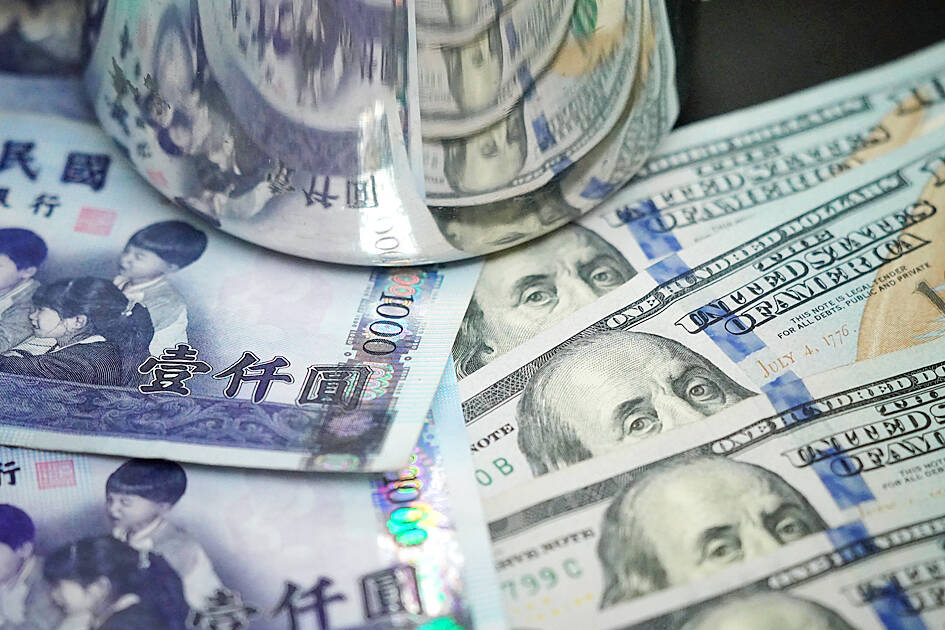Taiwan’s foreign exchange reserves totaled US$577.58 billion late last month, up US$9.06 billion from the previous month on the back of investment returns and favorable currency movements, the central bank said yesterday.
The balance meant Taiwan remained the fourth-largest holder of foreign-exchange reserves, trailing only China, Japan and Switzerland.
“The foreign exchange market was relatively quiet in January, compared with this month, when US President Donald Trump’s tariff policy with Canada, Mexico and China unnerved investors,” Department of Foreign Exchange Director-General Eugene Tsai (蔡炯民) told a news conference in Taipei.

Photo: CNA
The New Taiwan dollar on Monday touched NT$33 against the greenback amid panic selling of local shares as investors sought a safe haven in the US dollar before Washington’s tariffs on Canada, Mexico and China took effect.
Trump later announced a 30-day delay after Mexico and Canada agreed to step up border controls to curb illegal immigrants.
The central bank is confident it can maintain order and stability in the local currency market, helped by its plentiful foreign-exchange reserves and demand for the NT dollar by exporters, Tsai said.
Many exporters joined the market on Monday to sell the US dollars they had accumulated from trade, he said, adding that the central bank also intervened to slow volatility.
US tariffs might not necessarily weigh on the local currency, although Trump’s evasive trade stance is adding difficulty to the central bank’s formation of world views, Tsai said.
The emergence of DeepSeek, a relatively low-cost, but efficient Chinese artificial intelligence model, also created a big splash across global financial markets, as it sparked concern that orders at Nvidia Corp could slow, analysts said.
Dozens of Taiwanese firms collaborate with Nvidia.
As of the end of last month, foreign investors held US$864.8 billion of local stocks and debt, equivalent to 150 percent of Taiwan’s foreign-exchange reserves, Tsai said, adding that both figures represent historic highs.
Foreign capital might flee Taiwan if Trump makes good on his pledge to impose tariffs on semiconductors, limiting profit for local suppliers, analysts have said.

CHIP WAR: Tariffs on Taiwanese chips would prompt companies to move their factories, but not necessarily to the US, unleashing a ‘global cross-sector tariff war’ US President Donald Trump would “shoot himself in the foot” if he follows through on his recent pledge to impose higher tariffs on Taiwanese and other foreign semiconductors entering the US, analysts said. Trump’s plans to raise tariffs on chips manufactured in Taiwan to as high as 100 percent would backfire, macroeconomist Henry Wu (吳嘉隆) said. He would “shoot himself in the foot,” Wu said on Saturday, as such economic measures would lead Taiwanese chip suppliers to pass on additional costs to their US clients and consumers, and ultimately cause another wave of inflation. Trump has claimed that Taiwan took up to

A start-up in Mexico is trying to help get a handle on one coastal city’s plastic waste problem by converting it into gasoline, diesel and other fuels. With less than 10 percent of the world’s plastics being recycled, Petgas’ idea is that rather than letting discarded plastic become waste, it can become productive again as fuel. Petgas developed a machine in the port city of Boca del Rio that uses pyrolysis, a thermodynamic process that heats plastics in the absence of oxygen, breaking it down to produce gasoline, diesel, kerosene, paraffin and coke. Petgas chief technology officer Carlos Parraguirre Diaz said that in

SUPPORT: The government said it would help firms deal with supply disruptions, after Trump signed orders imposing tariffs of 25 percent on imports from Canada and Mexico The government pledged to help companies with operations in Mexico, such as iPhone assembler Hon Hai Precision Industry Co (鴻海精密), also known as Foxconn Technology Group (富士康科技集團), shift production lines and investment if needed to deal with higher US tariffs. The Ministry of Economic Affairs yesterday announced measures to help local firms cope with the US tariff increases on Canada, Mexico, China and other potential areas. The ministry said that it would establish an investment and trade service center in the US to help Taiwanese firms assess the investment environment in different US states, plan supply chain relocation strategies and

Japan intends to closely monitor the impact on its currency of US President Donald Trump’s new tariffs and is worried about the international fallout from the trade imposts, Japanese Minister of Finance Katsunobu Kato said. “We need to carefully see how the exchange rate and other factors will be affected and what form US monetary policy will take in the future,” Kato said yesterday in an interview with Fuji Television. Japan is very concerned about how the tariffs might impact the global economy, he added. Kato spoke as nations and firms brace for potential repercussions after Trump unleashed the first salvo of